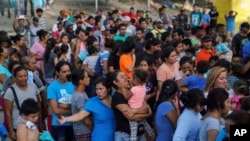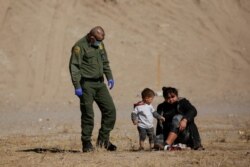The U.N. High Commissioner for Refugees (UNHCR) will work to identify the most needy migrants waiting in Mexico and help them complete paperwork to pursue asylum claims in the United States, a U.S. official told VOA.
Mirroring the UNHCR’s role in facilitating refugee resettlements around the world, the U.N. agency will work with the Biden administration to address the plight of tens of thousands of asylum-seekers the former Trump administration forced to remain in Mexico while awaiting U.S. immigration court dates under an initiative known as Migrant Protection Protocols (MPP) or the "remain in Mexico" policy.
"UNHCR is working to select the most vulnerable people or those who have more time in the MPP program to cross [into the United States]," Roberta Jacobson, coordinator for the southwest border on the White House National Security Council, told VOA.
The Biden administration, which has moved to end MPP, is expected to begin processing asylum claims February 19.
There are approximately 25,000 migrants with active MPP cases.
UNHCR screening of asylum seekers is expected to reduce the need to detain migrants who are allowed to enter the United States. Instead, most will be permitted to stay with sponsors or family members already in the U.S.
“We don’t have in mind detaining the majority of these persons,” Jacobson said. “We are going to start with a very small number to ensure that everything works well.”
Despite the UNHCR’s assistance, the United States will continue to decide who ultimately is granted asylum and allowed to legally remain in the country.
The U.S. Department of Homeland Security (DHS) has stressed that the policy shift does not mean the border is “opening for people to migrate irregularly to the United States."
DHS Secretary Alejandro Mayorkas said the initiative shows the administration’s commitment to immigration reform, but added that, due to capacity constraints at the U.S.-Mexico border exacerbated by the COVID-19 pandemic, change will take time.
“Individuals who are not eligible under this initial phase should wait for further instructions and not travel to the border,” Mayorkas said in a statement. “Due to the current pandemic, restrictions at the border remain in place and will be enforced.”
President Joe Biden suspended MPP within days of his inauguration last month. Until this week, it was unclear what would replace it and when the new policy would go into effect.
"This new process applies to individuals who were returned to Mexico under the MPP program and have cases pending before the Executive Office for Immigration Review (EOIR)," DHS said in a recent press release. "Individuals outside of the United States who were not returned to Mexico under MPP or who do not have active immigration court cases will not be considered for participation in this program and should await further instructions.”
The former Trump administration launched MPP in 2019 to deter mass migration to America’s southern border and ease overcrowding at U.S. detention facilities. The Trump White House defended the policy as both necessary and humane in that it persuaded many migrants not to make an arduous and dangerous journey northward.
Backers of the program called MPP a success.
“MPP was a game changer,” said Lora Ries, a senior research fellow at the Heritage Foundation, a conservative think-tank based in Washington. “And it was because migrants learned that just claiming fear wasn't the golden ticket to get into the U.S.”
Immigrant rights groups contend the policy forced many migrants into makeshift camps in northern Mexico where they endured hunger, disease and threats to their physical safety from criminal gangs.
Human Rights First reported that migrants have been kidnapped, tortured, and sexually assaulted by cartels that operate along the U.S.-Mexico border.
Last week, the Biden administration indicated that migrants will need to register with international organizations online or over the phone and then await instructions.
U.S. officials said migrants will be tested for COVID-19 before being allowed to enter the United States and will be required to wear face masks and comply with social distancing guidelines.
Jorge Agobian contributed to this story.





